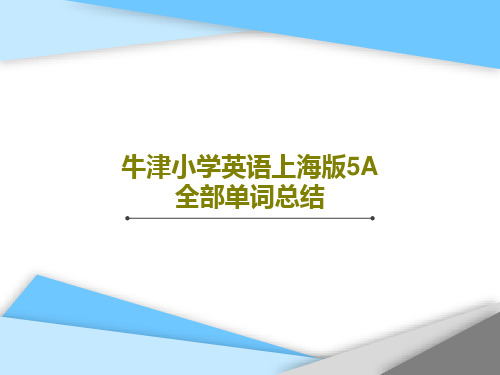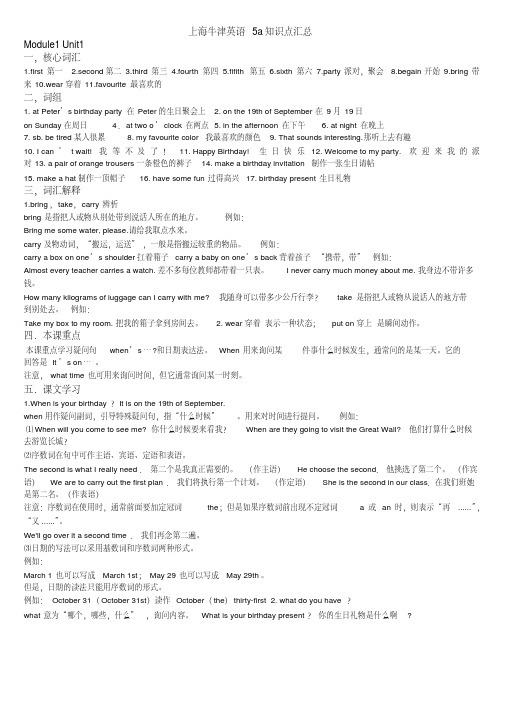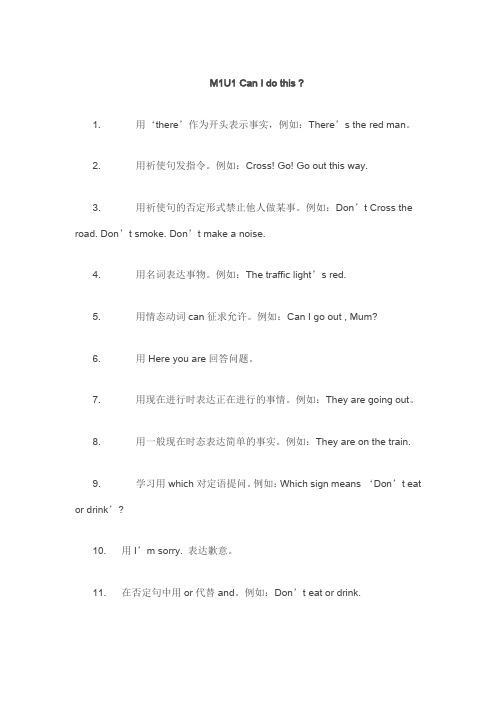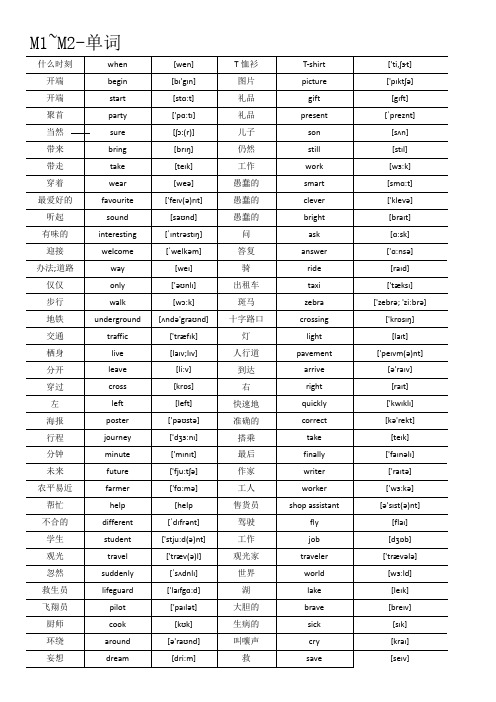沪教版牛津英语5a知识点汇总
牛津小学英语上海版5A全部单词总结共19页

▪
28、知之者不如好之者,好之者不如乐之者。——孔子
▪
29、勇猛、大胆和坚定的决心能够抵得上武器的精良。——达·芬奇
▪
30、意志是一个强壮的盲人,倚靠在明眼的跛子肩上。——叔本华
谢谢!
19
牛津小学英语上海版5A 全部单词总结
6、纪律是自由的第一条件。——黑格 尔 7、纪律是集体的面貌,集体的声音, 集体的 动作, 集体的 表情, 集体的 信念。 ——马 卡连柯
8、我们现在必须完全保持党的纪律, 否则一 切都会 陷入污 泥中。 ——马 克思 9、学校没有纪律便如磨坊没有水。— —夸美 纽斯
10、一个人应该:活泼而守纪律,天 真而不 幼稚, 勇敢而 鲁莽, 倔强而 有原则 ,热情 而不冲 动,乐 观而不 盲目。 ——马 克思
▪
26、要使整个人生都过得舒适、愉快,这是不可能的,因为人类必须具备一种能应付逆境的态度。——卢梭
▪
27、只有把抱怨环境的心情,化为上进的力量,才是成功的保证。——罗曼·罗兰
上海牛津英语5a知识点汇总,推荐文档

上海牛津英语5a知识点汇总Module1Unit1一,核心词汇1.first第一2.second第二3.third第三4.fourth 第四5.fifith第五6.sixth第六7.party派对,聚会8.begain开始9.bring带来10.wear穿着11.favourite最喜欢的二,词组1. at Peter’s birthday party在Peter的生日聚会上2. on the 19th of September在9月19日on Sunday在周日 4.at two o’clock在两点 5. in the afternoon在下午 6. at night在晚上7. sb. be tired某人很累 8. my favourite color我最喜欢的颜色 9. That sounds interesting.那听上去有趣10. I can’t wait! 我等不及了! 11. Happy Birthday! 生日快乐 12. Welcome to my party. 欢迎来我的派对 13. a pair of orange trousers一条橙色的裤子 14. make a birthday invitation制作一张生日请帖15. make a hat制作一顶帽子 16. have some fun过得高兴 17. birthday present生日礼物三,词汇解释1.bring,take,carry辨析bring是指把人或物从别处带到说话人所在的地方。
例如:Bring me some water, please.请给我取点水来。
carry及物动词,“搬运,运送”,一般是指搬运较重的物品。
例如:carry a box on one’s shoulder扛着箱子 carry a baby on one’s back背着孩子“携带,带”例如:Almost every teacher carries a watch.差不多每位教师都带着一只表。
上海版牛津英语5A教材复习要点汇总

M1U1 Can I do this ?1. 用‘there’作为开头表示事实,例如:There’s the red man。
2. 用祈使句发指令。
例如:Cross! Go! Go out this way.3. 用祈使句的否定形式禁止他人做某事。
例如:Don’t Cross the road. Don’t smoke. Don’t make a noise.4. 用名词表达事物。
例如:The traffic light’s red.5. 用情态动词can征求允许。
例如:Can I go out , Mum?6. 用Here you are回答问题。
7. 用现在进行时表达正在进行的事情。
例如:They are going out。
8. 用一般现在时态表达简单的事实。
例如:They are on the train.9. 学习用which对定语提问。
例如:Which sign means ‘Don’t eat or drink’?10. 用I’m sorry. 表达歉意。
11. 在否定句中用or代替and。
例如:Don’t eat or drink.M1U2 This is what I want1. 用What do you want ?询问“你想要什么?”2. 用I want…表达要求。
例如:I want some paper.3. 学习用Here’s /Here are …表达“给你……”。
4. 用Thank you very much.表达感谢。
5. 用形容词修饰东西。
例如:a large Coke6. 用情态动词can征求许可。
例如:Can I have some fish, please?7. 学习关于菜的名称。
例如:noodles vegetablesM1U3 This is what I need1. 关于学习用品的单词。
例如:books。
2. 用’What do you need for school ?’询问“你上学需要什么?”3. 用We need …表达“我们需要……”。
上海版牛津英语5A单词(含音标)与短语整理

M1~M2-单词乘,消费take[teɪk]野生的wild/waɪld]鹅(复数)geese复数[giːs]M1~M2-词组M1~M2-句子我知道了.I see.那听上去很有味.That sounds interesting.诞辰快活!Happy birthday!我等不及了.I can’t wait.迎接来到我的‘桔色’聚首.Welcome to my‘orange’party.我从车站走到彩虹小学.I walk from the bus stop to Rainbow Primary School.他在彩虹路站下车He gets off at Rainbow Road Bus Stop.你很大胆You’r e brave.我能问你些问题吗?Can I ask you some questions?我和爷爷一路下棋I play chess with grandpa.你能写封电子邮件给他们吗?Can you write an e-mail to them?这是一个白叟们的节日.This is a festival for old people.这是一场势均力敌(难打)的比赛This is a difficult match.恭喜!Congratulations!我想和你们所有人一路玩I want to play with all of you.让我们等着瞧!Let’s wait and see!不要放心!Don’t worry.我爱好骑自行车.I like riding bicycles.我有一个叫Tom的同伙I have a friend called Tom.这个房间朝东/南/西/北This room faces east/south/west/north.日光从窗子照进来The sun shines through the window.他们冬天住在南边They live in the south in winter.M3~M4-单词M3~M4-词组沿着…走walk along 向左转turn left 打搅了excuse me 向右转turn right 紧邻next to 到达get to在第一个十字路口at the first crossing 一个地铁站an underground stationM3~M4-句子我知道了.I see.我应当怎么办?What should I do?你很快会好起来的.You will be better soon你怎么了?What’s wrong with you?你一天刷几回牙?How many times a day do you brush your teeth?尝起来很棒.It tastes great.。
牛津上海版五年级上册英语5A Module 1- Module 2 重点句型及语法点汇总

上海沪教版5A 期中重点句型&语法总结M1U11.When is your birthday?It’s on …..2.What time is it?It’s…….3.That sounds interesting.I can’t wait.4.Welcome to……5.What do you have?I have……6.It’s a picture of you7.Let’s have some fun.语法考察点:1.基数词变序数词的规律,2.月份日期的正确书写与表达,时间介词的使用3.现在进行时的基本形式,用法以及使用标志,M1U21.Ben rides his bike to school.=Ben goes to school by bike.2.She/He always/never walks.3.How do you come to school?I come to school by….4.where do you cross the road/ How do you cross the road?5.That’s correct.6.I leave home at a quarter to eight.7.I don’t live school. I come to school by bus.语法考察点:1.祈使句表达交通规则2.频度副词的程度:always(100%)>usually(80%)>often(60%)>sometimes(40%)>seldom(20%)>hardly(5%)>rarely never(0%)习惯上位于系动词、助动词、情态动词之后,行为动词之前。
3.用特殊疑问句表达如何上学以及回答如何遵守交通规则4.如何表示时间,①所有的时间都可以用“小时+ 分钟”;②如果所表述的时间在半小时之内,可以用“分钟+ past + 小时”;③如果所表述的时间在半小时之外,可以用“(相差的)分钟+ to + (下一)小时”M1U31.what do you want to be?I want to be a/an ……2.I am from Rainbow Primary School.3.Can I ask you some question?Of course.4.What’s your job?/ What do you do?My job is…../I am a/an…..5.He wants to fly a aeroplane, but he is afraid of flying.6.He wants to be a star. But he is not good at singing.语法考察点:1.运用want to do询问别人梦想工作及回答,want to do/want sth.2.询问别人工作及回答,what’s your job/what do you do?3.like用法,①like+sb./sth.“喜欢某人/某物”;②like doing sth.“喜欢做(某事)”;③like sb.to do (sth)“想要某人做(某事)”;④like 作介词,意为“像……”,在句中一般作状语或表语.M2U11.How often do you visit them?I visit them once a week.2.what do you do with them?I often play chess with my grandfather.3.who’s there?4.Your grandchild .Little Red Riding Hood.5.Grandma,what strong arms you have.6.Are you all right?I am OK. Thank you.语法考察点:1.多久一次how often的用法2.表达频率的词组,如次数超过两次时用基数词加次数(times)组成,once,twice特殊记3.What 引导的感叹句,与how引导的感叹句的对比M2U21.We both like sports.2.We both like helping people.3.We like each other and we like to be together4.It is a different match for both teams.5.We don’t have any water.6.Don’t worry7.I am Tony from Room 5068.I like running and football. How about you?9.I have a good friend called Brett.10.She’s happy like a bee语法考察点:1.both 和all 的用法区别,both指两者都,all指三者或以上。
沪教版小学英语5A单词、句型、知识点归纳

U1cook pilot taxi driverU2by bike by bus by car on footU3first second third eighth ninth twelfth twentieth thirtiethU4always usually often sometimes neverU5same differentU6bathroom bedroom kitchen living roomU7beach seaU8hill lake mapU9flower shop post office hospital toy shopU10gently strongly slowly quicklyU11put out fire grow cropsU12Don’t smoke! Don’t play with matches!Learn the soundsU1desk mask U2wasp crisp U3toast postman U4dish wash U5dress princess U6bread ice cream U7fruit grandpa tree U8slide snake swingU9smoke spider star U10scarf skateboardU11this that U12thin pathU1What do you want to be? I want to be a pilot. I want to fly a plane in the sky.U2How do you come to school?I come to school on foot.U3When’s your birthday? It’s on 26th September.\That sounds interesting. \I can’t wait! \Thank you so much.\Let’s have some fun!U4What do you usually do with your grandparents? I usually play chess with my grandpa. \This is Mary. \Come with me!U5We both like sport. \I’m bored.\I don’t know.\Is that Ken?U6I’m doing my homework.U7Is Paul collecting shells? Yes, he is. \It’s fun.U8What are you doing? I’m reading the map.U9How do you get to the post office?Walk along Winter Street.\Turn left at Spring Street. \ Excuse me. \Is that right?\Let’s go!U10The children are flying their kites happily. \Me too.\Why?U11We use water to wash our hands.U12We must be careful with fire. We mustn’t play with matches. \Safety first.新版英语5A知识点总结1、What do you want to be? I want to be a/an+职业What does kitty want to be? She wants to be a/an+职业2、I want to be a pilot. I want to fly a plane.I want to be a doctor. I want to help people.I want to be a teacher. I want to teach English in a school.I want to be a cook. I want to cook nice food.3、Help! Help! It’s too high.4、He is afraid of flying. He is not good at singing.A chick falls into the lake! A lifeguard jumps into the lake too. Grandma puts on the mask and Martin laughs.5、How do you come to school? I come to school on foot. (Alice and I walk to schoo l together.)6、I live near our school. I live far from our school.7、at Happy primary School on Green Streetat underground stationat Spring Street Bus Stop8、she gets off the trai n at Park Street Station.9、Please go away.10、When’s your birthday? It’s on 26th September.11、What time does the party begin? It begins at two o’clock in the afternoon.12、That sounds interesting. I can’t wait!13、数词分为基数词(数量)和序数词(顺序)基数词变序数词的规则:巧记基数词变序数词:一、二、三特殊记;one-first,two-second,three-third.八去t,九减e,In China, people usually do not open gifts right away.In Western countries, people usually open gifts right away. 14、What do you usually do with your grandparents? I usually play chess with my grandpa. My grandparents live in the UK. I often write emails to them. My grandparents live far from my home. I often visit them at the weekend. We like going to the park together.15、Always/never usually often sometimes never一般现在时态:动词原形或动词+s/es表示经常发生的事情、动作或存在的状态;判断依据:be动词是am,is,are;动词是原形或动词+s/es;句中没有时间状语或有always,never,usually often,sometimes,every day,on Sundays等。
沪教版牛津英语5a知识点汇总
百度文库- 让每个人平等地提升自我沪教版(上海)牛津英语5a知识点汇总Module1Unit1一,核心词汇第一第二第三第四第五第六派对,聚会开始带来穿着最喜欢的二,词组1. at Peter’s birthday party在Peter的生日聚会上2. on the 19th of September在9月19日on Sunday在周日 4.at two o’clock在两点 5. in the afternoon在下午 6. at night在晚上7. sb. be tired某人很累 8. my favourite color我最喜欢的颜色 9. That sounds interesting.那听上去有趣10. I can’t wait! 我等不及了! 11. Happy Birthday! 生日快乐 12. Welcome to my party. 欢迎来我的派对 13. a pair of orange trousers一条橙色的裤子 14. make a birthday invitation制作一张生日请帖15. make a hat制作一顶帽子 16. have some fun过得高兴 17. birthday present生日礼物三,词汇解释,take,carry辨析bring是指把人或物从别处带到说话人所在的地方。
例如:Bring me some water, please.请给我取点水来。
carry及物动词,“搬运,运送”,一般是指搬运较重的物品。
例如:carry a box on one’s shoulder扛着箱子 carry a baby on one’s back背着孩子“携带,带”例如:Almost every teacher carries a watch.差不多每位教师都带着一只表。
I never carry much money about me.我身边不带许多钱。
沪教版牛津英语5a知识点汇总
沪教版(上海)牛津英语5a知识点汇总Module1Unit1一,核心词汇1.first第一2.second第二3.third第三4.fourth 第四5.fifith第五6.sixth第六7.party派对,聚会8.begain开始9.bring带来10.wear穿着11.favourite最喜欢的二,词组1. at Peter’s birthday party在Peter的生日聚会上2. on the 19th of September在9月19日on Sunday在周日 4.at two o’clock在两点 5. in the afternoon在下午 6. at night在晚上7. sb. be tired某人很累 8. my favourite color我最喜欢的颜色 9. That sounds interesting.那听上去有趣10. I can’t wait! 我等不及了! 11. Happy Birthday! 生日快乐 12. Welcome to my party. 欢迎来我的派对 13. a pair of orange trousers一条橙色的裤子 14. make a birthday invitation制作一张生日请帖15. make a hat制作一顶帽子 16. have some fun过得高兴 17. birthday present生日礼物三,词汇解释1.bring,take,carry辨析bring是指把人或物从别处带到说话人所在的地方。
例如:Bring me some water, please.请给我取点水来。
carry及物动词,“搬运,运送”,一般是指搬运较重的物品。
例如:carry a box on one’s shoulder扛着箱子 carry a baby on one’s back背着孩子“携带,带”例如:Almost every teacher carries a watch.差不多每位教师都带着一只表。
上海牛津英语5A语法知识点复习
2. 时间介词:at 某一时间点on 具体时间on Monday evening in 一段时间in the afternoon 在下午;3. bring sth. to sb, 带某物东西给某人5. sb. be tired 某人很累7. That sounds interesting. 那一定很精彩9. What 's the date today? 今天是几号?at night 在夜晚M1U1 My birthday1. what time = when 什么时候what time 通常提问具体时间; when 提问具体某一天e.g. at two o'clock 在两点; at noon 在中午;e.g. on the 19th of September 在 9 月 19 日;on Sunday 在周日;在周一傍晚; on New Year'sDay 在元旦节in January 在 1 月; in winter 在冬天4. an orange party 一个橘色的晚会6. favourite = like …best 最喜欢8. a birthday invitation 一张生日请柬It's August 31. 今天是 8月 31号It's Friday. 今天是星期五10. put on表示"穿上”的动作,wear表示"穿着”的状态11. When is your birthday? 什么时候是你的生日13. at Peter's birthday party 在皮特的生日晚会上15. the next morning. 第二天的上午,第二天早上12. a pair of orange trousers 一条橘色的裤子14. Have some fun = have a good time 玩的很高兴16. on one'sbed 在某人的床上17. January comes first 一月份在一年中的第一个月M1U2 My way to school1. go to school on foot = walk to school 步行上学2. go to school by bicycle = ride a bicycle to school 骑自行车上学3. by + 交通工具 = take + a/an + 交通工具 e.g. by bus = take a bus 乘公交车4. leave home 离家5. a quarter to eight 在七点四十五6. What about = How about 怎么样7. get up 起床8. 地点介词:in 大范围,大地方 e.g. arrive in Beijing 到达北京;in the street在街上at 具体位置,小地方 e.g. arrive at school 到达学校 ; at traffic lights 在红路灯处 ; at zebra crossings 在斑马线 ; at Rainbow Road Bus Stop 在彩虹路站on 在某物的表面上 e.g. wait on the pavement 在人行横道上;live on Green Road 在格林路上5A 语法知识点复习9. cross the road 穿过马路10. wait for the green light 等绿灯11. look left and then look right 向左向右看13. get off the train 下地铁15. How do you come to school? 你怎样去学校?M1U3 My future1. want to do sth. 想要做某事3. help sick people 救治病人5. sell things to people 卖东西7. in the future 在将来12. That's right = That 's correct 很正确14. from…to… 从哪里到哪里2. What do you want to do/ be? 你想做什么?4. give lessons to student 给学生们上课6. do a survey 做一个调查8. dream job 梦想的职业9. What 's your job? = What do you do? 你是做什么的?(提问职业)10. travel around the world 环游世界12. be afraid of doing sth. 害怕做某事be afraid to do sth. 害怕去做某事13. jump into the lake 跳进湖中15. help sb. do sth. 帮助某人做某事M2U1 Grandparents1. ask sb. about sth. 问某人某事3. at weekends = at the weekend 在周末5. write an e-mail to them 写电子邮件给他们7. go shopping 去购物9. 体育器材前不加 the e.g. play badminton 打羽毛球乐器前加 the e.g. play the piano 弹钢琴10. on ones way to 在去哪里的路上12. run away 逃跑14. 节日 the Double Ninth Festival 重阳节the Spring Festival 春节the Mid-Autumn Festival 中秋节15. see a flower show 看花展17. a festival for old people 一个老人的节日19. How often … 多久(提问频率)11. be good at doing sth 擅长做某事14. in the lake 在湖里面2. once a week 一周一次4. play chess 下棋6. talk to them on the Internet 在网上交流8. do the housework 做家务活11. knock at the door 敲门13. a traditional Chinese festival 一个传统的中国节日New Year's Day 元旦the Dragon Boat Festival 端午节16. eat Double Ninth cakes 吃重阳糕18. in Old People's Homes 在敬老院标志词: always, usually, often, sometimes, seldom, never , every day ,once a week 等20.感叹句 What 后面跟名词词组 e.g. What strong arms you have! How 后面跟形容词e.g. How strong your arms are!M2U2 Friends1. in the same class 在同一个班级里 3. in different teams 在不同的队伍 5. like doing something 喜欢做某事 7. Let 'wait and see!让我们等着瞧! 9. a difficult match 一场势均力敌(难打)的比赛2. at the same school 在同一所学校4. like each other 相互喜欢 6. after school 放学后8. play with all of you 和你们所有人一起玩10. Congratulations!恭喜!11. be different from 与 不同 e.g. This sweater is different from that one. 这件毛衣与那一件不同。
上海牛津版英语5A-M2U2知识点
5A M2U2必背必默内容【单词】1.same相同的2.different不同的3.both两个都4.all全部5.class班级6.together一起7.sport运动8.volleyball排球9.badminton羽毛球10.member成员11.win获胜12.difficult困难的13.half-time中场休息14.worry担心15.golden金色的16.hero英雄17.congratulation祝贺18.team队19.floor楼层20.kind种类21.pet宠物22.snake蛇23.spider蜘蛛24.rat老鼠25.vet兽医26.bee蜜蜂27.hour小时【词组】1.in the same class在同一个班级2.at different schools在不同的学校3.favourite sport最喜欢的运动4.play badminto n打羽毛球5.help old people帮助老人6.cross the road穿马路7.play football踢足球8.play basketball打篮球9.play volleyball打排球10.each other互相11.the school's football club学校足球俱乐部12.after school放学后13.like singing and dancing喜欢唱歌跳舞14.play with all of you和你们大家一起玩15.many kinds of许多种类的16.all kinds of各种各样的【句子】1.How about you?=What about you?你怎么样?2.Alice and I both go to Rainbow primary School.爱丽丝和我都在彩虹小学上学。
3.We are in the same class.我们在同一个班级。
- 1、下载文档前请自行甄别文档内容的完整性,平台不提供额外的编辑、内容补充、找答案等附加服务。
- 2、"仅部分预览"的文档,不可在线预览部分如存在完整性等问题,可反馈申请退款(可完整预览的文档不适用该条件!)。
- 3、如文档侵犯您的权益,请联系客服反馈,我们会尽快为您处理(人工客服工作时间:9:00-18:30)。
沪教版()牛津英语5a知识点汇总Module1 Unit1一,核心词汇1.first第一2.second第二3.third第三4.fourth 第四5.fifith第五6.sixth第六7.party派对,聚会8.begain开始9.bring带来10.wear穿着11.favourite最喜欢的二,词组1. at Peter’s birthday party在Peter的生日聚会上2. on the 19th of September在9月19日on Sunday在周日 4.at two o’clock在两点 5. in the afternoon在下午 6. at night在晚上7. sb. be tired某人很累 8. my favourite color我最喜欢的颜色 9. That sounds interesting.那听上去有趣10. I can’t wait! 我等不及了! 11. Happy Birthday! 生日快乐 12. Welcome to my party. 欢迎来我的派对 13. a pair of orange trousers一条橙色的裤子 14. make a birthday invitation制作一生日请帖15. make a hat制作一顶帽子 16. have some fun过得高兴 17. birthday present生日礼物三,词汇解释1.bring,take,carry辨析bring是指把人或物从别处带到说话人所在的地方。
例如:Bring me some water, please.请给我取点水来。
carry及物动词,“搬运,运送”,一般是指搬运较重的物品。
例如:carry a box on one’s shoulder扛着箱子 carry a baby on one’s back背着孩子“携带,带”例如:Almost every teacher carries a watch.差不多每位教师都带着一只表。
I never carry much money about me.我身边不带许多钱。
How many kilograms of luggage can I carry with me? 我随身可以带多少公斤行? take是指把人或物从说话人的地方带到别处去。
例如:Take my box to my room.把我的箱子拿到房间去。
2. wear 穿着表示一种状态; put on 穿上是瞬间动作。
四.本课重点本课重点学习疑问句when’s …?和日期表达法。
When 用来询问某件事什么时候发生,通常问的是某一天。
它的回答是It’s on …。
注意,what time也可用来询问时间,但它通常询问某一时刻。
五.课文学习1.When is your birthday?It is on the 19th of September.when用作疑问副词,引导特殊疑问句,指“什么时候”。
用来对时间进行提问。
例如:⑴When will you come to see me? 你什么时候要来看我? When are they going to visit the Great Wall? 他们打算什么时候去游览长城?⑵序数词在句中可作主语、宾语、定语和表语。
The second is what I really need.第二个是我真正需要的。
(作主语) He choose the second.他挑选了第二个。
(作宾语) We are to carry out the first plan.我们将执行第一个计划。
(作定语) She is the second in our class.在我们班她是第二名。
(作表语)注意:序数词在使用时,通常前面要加定冠词 the;但是如果序数词前出现不定冠词a或an时,则表示“再......”,“又......”。
We'll go over it a second time.我们再念第二遍。
⑶日期的写法可以采用基数词和序数词两种形式。
例如:March 1也可以写成March 1st; May 29也可以写成May 29th。
但是,日期的读法只能用序数词的形式。
例如: October 31(October 31st)读作October(the)thirty-first 2. what do you have?what意为“哪个,哪些,什么”,询问容。
What is your birthday present?你的生日礼物是什么啊?Module1 Unit2一,核心词汇1.taxi出租车2.underground地铁3.zebra crossing斑马线4.traffic lights红绿灯5.pavement 人行道6.live住7.leave离开8.on foot走路9.arrive 到达 10.cross横过 11.by通过二,词组1. ride his bike to school骑自行车去学校2. walk to school / go to school on foot走路去学校3.leave home离开家4.at a quarter to eight在七点三刻5. live near school住的离学校近6. arrive at school到达学校7. cross the road穿过马路8. at traffic lights在红路灯处9. wait for the green light等绿灯 10. on the pavement在人行道上 11. look left向左看/向右看12. at zebra crossings在斑马线的地方13. underground station地铁站 14. take the train坐地铁 15. get off the train下地铁 16. at…Station在…站 17. take Bus No.12 乘12路公交车18. get off at Rainbow Road Bus Stop 在彩虹路站下车19. from the bus stop to Rainbow Primary School从车站到彩虹小学三,词汇解释1.live⑴ lively 有“活泼的、快活的、生动的”等意思,可以指人或物,可作定语或标语;但它没有“活着的”意思,而其他三个都有。
如:Young children are usually lively. 小孩子们通常是活泼的。
He told a very lively story. 他讲了一个生动的故事。
⑵alive、live、living都有“活的、有生命的”意思,如:This is a live (=living) fish. (=This is a fish alive.) 这是一条活鱼。
Who's the greatest man alive (=living man)?谁是当今最伟大的人物?(指人,不能用live) The fish is still alive (=living)那条鱼还活着。
(指动物作表语时不能用live)。
(3)只有living前加the方可表示“活着的人”,作主语时,视作复数。
如:The living are more important to us than the dead. 活着的人对我们来说比死去的人更重要。
2. arrivearrive 表示“到达某地”时,后面要接介词,到达的地方围大是多用in,地方较小时用at,如:We arrived in Paris.我们到达巴黎。
We arrived at the station.我们到达车站。
reach 后面直接跟表示地点的词。
He reached London. 他到达了伦敦。
get to 到达What time shall we get to Shanghai? 我们什么时候到达四.本课重点本课的重点是how的用法,意为“怎样,怎么”,用来询问方式,方法;介词by,on的用法五.课文学习1. How do you come to school, Alice?★ how用来提问方式、方法。
一般用on foot,by bus等来回答。
★ come 的意思是“来;到来”,不及物动词。
2. When do you arrive at school?At about eight o’clock. 表达在几点的介词用atLook left and look right before you cross the road。
cross这里是动词,意为“穿过”。
Module1 Unit3一,核心词汇1.worker工人2.piolet飞行员3.farmer 农民4.shop assistant店员5.fiy飞6.help帮助7.sick生病的二,词组1. 想做某事 want to do sth.2. 飞行员/医生/厨师/农民/营业员pilot / doctor / cook / farmer / shop assistant 3.fly an aeroplane in the sky在空中开飞机4.help sick people帮助病人 5. cook nice food烧美味的食物6. grow vegetables种蔬菜7. give lessons to students给学生上课8. sell things 卖东西9. doing a survey做一个调查 10. in the street在街上11. Can I ask you some questions? 我能问你一些问题吗? 12. in the future在未来,将来 13. dream job梦想的职业14. work at home在家工作 15. travel around the world环游世界 16. be afraid of doing sth. 害怕做某事17. be good at singing擅长唱歌 18. hear a cry听到一阵哭声 29. Jump into the lake跳进湖中 20. You’re brave.你很勇敢 21. froggy / chick青蛙/小鸡三.词汇解释help的用法:(1). vt. 帮助,通常用help sb. with sth.或help sb. (to) do sth.形式。
如: Can I help? 要我帮忙吗?Can I help you? 我能为你效劳吗?(向顾客主动提供帮助时的用语,与上一句在语境、功能上不一样。
